| Srl | Item |
| 1 |
ID:
181403


|
|
|
|
|
| Summary/Abstract |
The COVID-19 pandemic has exposed additional weaknesses of the already troubling “flag of convenience” practices under international law; the passenger cruise industry was especially impacted. Most cruise ships under distress from the pandemic received little aid from their flag states, and many vessels were denied entry into ports of nonflag states (regardless of whether an outbreak had been documented onboard). States and vessels lacked clear guidance around their rights and responsibilities under the extraordinary circumstances, resulting in a less efficient response to a dangerous situation. This article reviews the current status of international law concerning port and flag state duties to distressed vessels, and suggests the creation of flag state medical liability to help clarify decision-making during future health crises.
|
|
|
|
|
|
|
|
|
|
|
|
|
|
|
|
| 2 |
ID:
018851
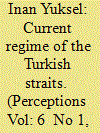

|
|
|
|
|
| Publication |
March-May 2001.
|
| Description |
99-116
|
|
|
|
|
|
|
|
|
|
|
|
|
|
|
|
| 3 |
ID:
139598
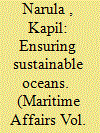

|
|
|
|
|
| Summary/Abstract |
Ensuring sustainable oceans and seas is vital for the well-being of the planet. However, oceans – which are the largest ecosystems – are degrading rapidly, which is a cause of anxiety. The paper presents some of the growing concerns about the health of the oceans and analyses three main drivers of ocean degradation, viz. overexploitation for resources, unintended impacts of anthropogenic activities and weak governance structures. Some of the ongoing work on adopting Sustainable Development Goals (SDGs) for the oceans, and by the Biodiversity Beyond National Jurisdiction (BBNJ) working group for governance of the “high seas”, are then discussed. The paper suggests a way ahead and proposes that India should play a larger role in the ongoing discussions. The paper concludes that there is a need for international cooperation and global support, and ensuring sustainable oceans is the key to sustainable development.
|
|
|
|
|
|
|
|
|
|
|
|
|
|
|
|
| 4 |
ID:
128119
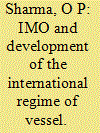

|
|
|
|
|
| Publication |
2013.
|
| Summary/Abstract |
It is evident that the famous English poet, Samuel Taylor Coleridge had a premonition about the fate of the ocean in the closing years of the twentieth century. Marine pollution is very much a product of modern technology. Recognizing marine pollution as a problem of global dimension is of relatively recent origin
|
|
|
|
|
|
|
|
|
|
|
|
|
|
|
|
| 5 |
ID:
097320


|
|
|
|
|
| Publication |
2010.
|
| Summary/Abstract |
The participation of the Indian navy in anti-piracy operations off the Somali coast is perceived by many as a manifestation of India's apparent willingness to take on a larger role on the global stage. This article explores the possibility for India to play a more important role in solving the Somali piracy crisis. While recognising the limits and short-term impact of the military response, the author argues for the continuation of intervention by foreign navies in the region, the necessity for international consensus on how to deal with the pirates and the implementation of a land-based military response aimed at destroying the pirates' networks. The latter would have for their main objective not to eliminate the threat posed by Somali pirates but to lower its impact. Nevertheless, the author warns against the potential consequences of using military raids and air strikes to counter piracy. In that context, and as a major proponent of the principles of non-intervention and respect of state sovereignty, the greatest challenge India will have to face will be a political one.
|
|
|
|
|
|
|
|
|
|
|
|
|
|
|
|
| 6 |
ID:
053546
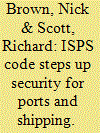

|
|
|
| 7 |
ID:
163552


|
|
|
|
|
| Summary/Abstract |
Discussions about “peak oil demand” tend to focus on passenger vehicles, often from a US and European perspective. These discussions often ignore other markets, such as marine transport, which collectively would also need to show a reduction in demand if oil consumption were to reach an inflection point. We explore the outlook for marine bunkers, a niche market that accounts, depending on estimates, for up to 7% of the demand barrel. We focus on the possible impact of new environmental restrictions that aim to drastically reduce sulfur oxide (SOx) emissions from ships as of January 2020, placing them against the background of past innovations that have been reshaping ships’ fuel consumption patterns and assessing their likely impact on future innovation in the sector. We conclude that the rules might paradoxically end up slowing down what might have otherwise been a more rapid transition of the shipping market away from traditional bunker fuels. The rules will, however, adversely affect simple refineries and producers of heavy, sour crude oil grades, whose prices are sometimes indexed to that of high sulfur fuel oil (HSFO).
|
|
|
|
|
|
|
|
|
|
|
|
|
|
|
|
| 8 |
ID:
059797
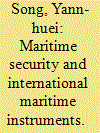

|
|
|
| 9 |
ID:
139597


|
|
|
|
|
| Summary/Abstract |
Marine species are known to use acoustic signals for biologically critical functions such as foraging, communication, navigation, etc. The unregulated maritime activities in the Indian Ocean Region (IOR) are translating into a rapid rise in the ambient noise and consequent acoustic degradation of the marine ecosystem. The environmental conservation initiatives are seen to be in direct conflict with the economic growth imperatives and are thus faced with significant political opposition. The lack of awareness regarding the acoustic aspect of the marine ecosystem towards generating credible underwater domain awareness is a major cause of concern and limits the effectiveness of any conservation efforts. Further, the IOR with its tropical littoral waters presents suboptimal performance of the underwater sensors deployed to generate underwater domain awareness. The authors attempt to provide an alternate perspective of the acoustic degradation of the marine ecosystem as a result of heightened maritime activities in the IOR. The complexities of formulating the regulatory framework and associated monitoring mechanism are also discussed.
|
|
|
|
|
|
|
|
|
|
|
|
|
|
|
|
| 10 |
ID:
133954
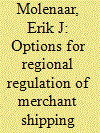

|
|
|
|
|
| Publication |
2014.
|
| Summary/Abstract |
Regulation of international merchant shipping is predominantly carried out by global bodies, of which the International Maritime Organization (IMO) is the most prominent. The UN Convention on the Law of the Sea nevertheless explicitly or implicitly allows (limited) unilateral prescription by flag, coastal, and port states as well as the exercise of these rights collectively at the regional level. Some IMO instruments acknowledge the right to impose more stringent standards and others even encourage regional action. Moreover, while the mandate and practice of the IMO have expanded significantly since its establishment in 1958, further expansion is subject to constraints. This article explores various options for regional regulation of merchant shipping outside of the IMO. Special attention is given to such options in the Arctic region in the context of the efforts within the IMO regarding the adoption of the Mandatory Code for Ships Operating in Polar Waters.
|
|
|
|
|
|
|
|
|
|
|
|
|
|
|
|
| 11 |
ID:
167517


|
|
|
|
|
| Summary/Abstract |
The article seeks to contribute to the development of a conceptual framework for the ongoing regulatory discussions on autonomous ships at the International Maritime Organization (IMO). It elaborates on the distinction between the level of autonomy and the level of manning and highlights the sliding scale that features in both. Certain building blocks that are needed for regulating autonomous ships are identified, followed by an assessment of how key existing IMO rules deal with the challenges and an analysis of available precedents. The conclusion is that the on-going exercise is unique, almost without precedent, and that the work that has just started at IMO, so far at least, fails to address the most important—and complex—regulatory challenges.
|
|
|
|
|
|
|
|
|
|
|
|
|
|
|
|
| 12 |
ID:
103777
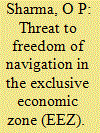

|
|
|
| 13 |
ID:
093479


|
|
|
|
|
| Publication |
2010.
|
| Summary/Abstract |
In the environmentally exposed Baltic Sea, a prolonged confrontation has set the transport interests of Russian crude oil against environmental interests, promoted by Russia's neighbours. During the 1990s all the Baltic littoral states - including Russia - collaborated well on marine environmental issues. When Russian oil exports accelerated after 1999, this environmental understanding broke down. Russian interests shifted as its oil income suddenly rose drastically. The confrontation peaked over a proposal to make the entire Baltic Sea into a particularly sensitive sea area (PSSA) under the International Maritime Organization (IMO). The proposal was adopted by the IMO in spite of Russian objections. The article shows how environmental interests trump transport interests in a manner that may not be sustainable. The case illustrates the need for environmental collaboration to be flexible in the face of shifting constellations of competing interests.
|
|
|
|
|
|
|
|
|
|
|
|
|
|
|
|
| 14 |
ID:
140741


|
|
|
|
|
| Summary/Abstract |
While shipping is a carbon efficient transport mode, given that roughly 90% of the world trade is carried by ships, the negative impact of shipping on human health and the natural environment is significant. One of the attempts being made by the shipping industry to reduce its environmental impact is to use liquefied natural gas (LNG) as a marine fuel. This article examines the regulatory legal regime in relation to the use of LNG as marine fuel and highlights the areas where further development is necessary.
|
|
|
|
|
|
|
|
|
|
|
|
|
|
|
|
| 15 |
ID:
167521


|
|
|
|
|
| Summary/Abstract |
Building capacity in ocean affairs, the law of the sea, and marine scientific research in relation to the needs of developing countries is an integral part of the U. Convention on the Law of the Sea and associated instruments, including the International Maritime Organization (IMO) treaty regime. This article traces the development of capacity-building initiatives at the World Maritime University (WMU) over the past three decades, including the establishment of the WMU–Sasakawa Global Ocean Institute in 2018. The establishment of the new institute should be viewed within the wider context of the extraordinary philanthropy of the Sasakawa Peace Foundation and the Nippon Foundation in building human resource capacity and in supporting advanced academic research on complicated and contentious ocean issues. The article describes the extensive consultation process that informs the research, education, and capacity development agenda of the new institute, including work on the ocean-related goals of the 2030 Agenda for Sustainable Development.
|
|
|
|
|
|
|
|
|
|
|
|
|
|
|
|